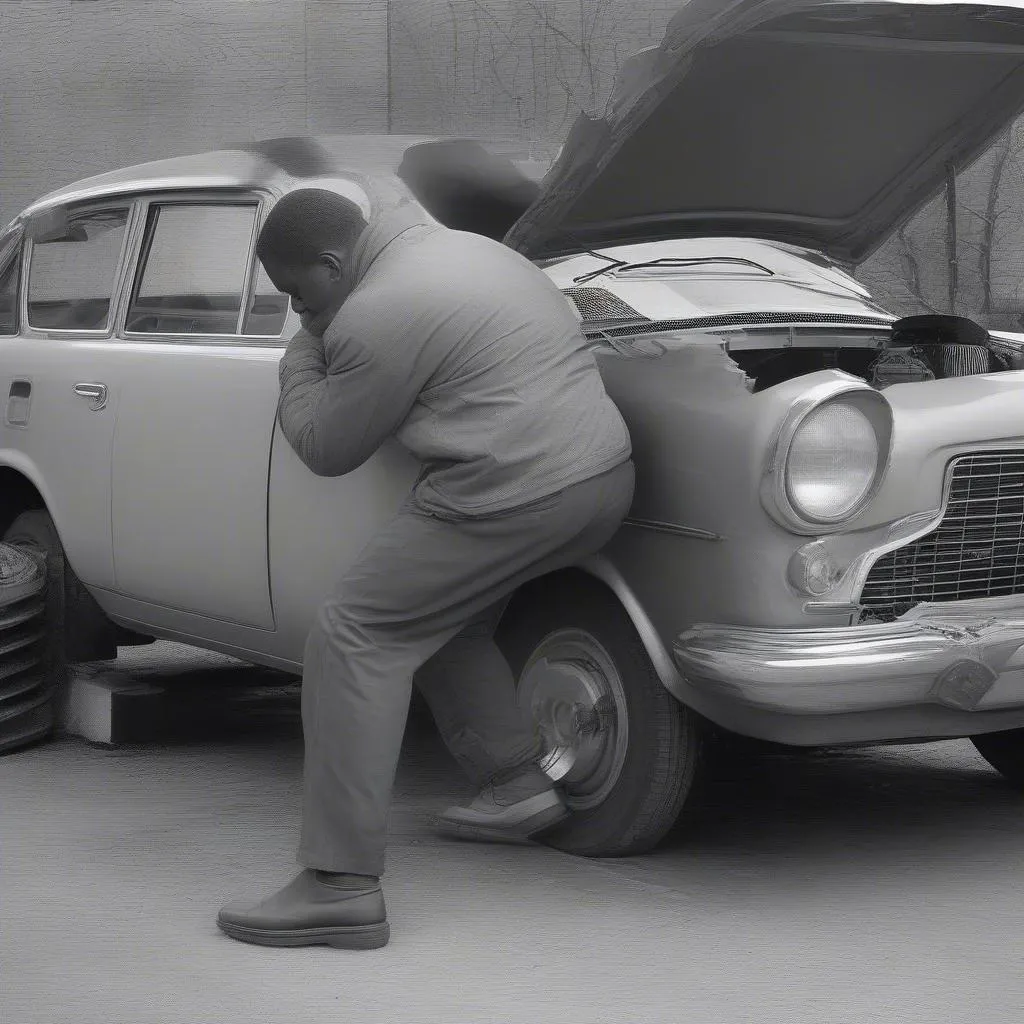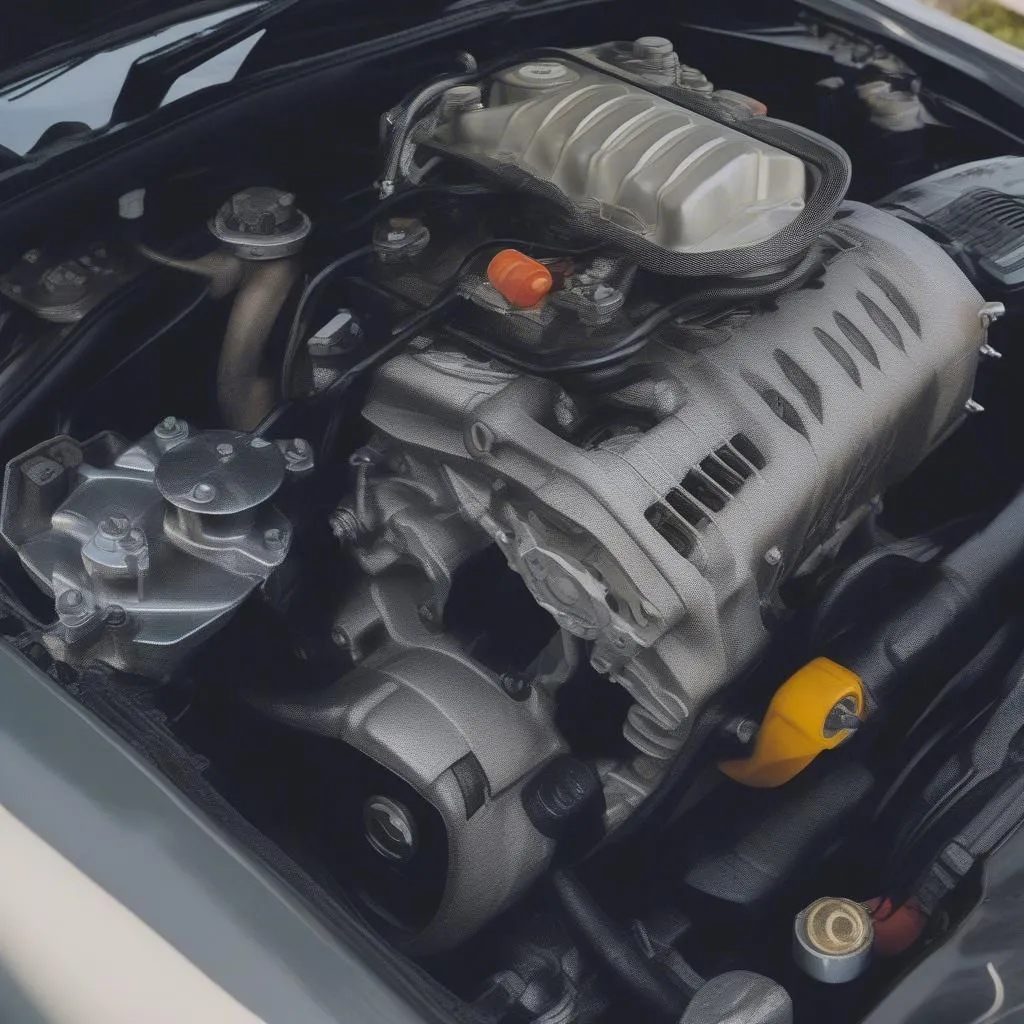It’s a frustrating experience: you turn the key, the engine cranks, but your car won’t start. Your heart sinks as you realize, “This is it. My car is dead.” But is it really dead, or is it just the battery or alternator that’s gone kaput?
This scenario is more common than you think, and it’s a question that plagues many car owners. Knowing how to tell if your car’s troubles are due to a dead battery or a failing alternator can save you time, money, and a lot of frustration.
Understanding the Role of Your Battery and Alternator
Imagine your car’s battery as a big, powerful power bank that provides a jolt of energy to start the engine. Once the engine is running, it’s the alternator’s job to keep the battery charged and power all the car’s electrical components.
The Battery’s Role:
- The Initial Spark: The battery is responsible for supplying the initial surge of power needed to crank the engine and get it running. Think of it as the starter pistol in a race.
- Powering Accessories: The battery also powers all the electrical components in your car while it’s not running, such as your headlights, radio, and power windows.
The Alternator’s Role:
- Charging the Battery: While the engine is running, the alternator acts like a power plant, constantly recharging the battery.
- Powering Electrical Systems: It’s the primary source of power for all the electrical components in your car while it’s running.
Dead Battery vs Alternator: Symptoms and Causes
Now, let’s delve into the symptoms that signal a dead battery or a failing alternator.
Dead Battery Symptoms:
- Slow Cranking: The most common sign is a slow cranking sound when you turn the key. It’s like the engine is sluggishly trying to wake up.
- Dim Headlights: If your headlights are noticeably dimmer than usual, it could be a sign of a weak battery.
- Clicking Noise: You might hear a clicking sound instead of a cranking sound when you turn the key. This indicates the battery doesn’t have enough power to even start the starter motor.
- Dashboard Warning Lights: Some cars have a battery warning light on the dashboard. If it’s lit, it’s a definite indicator that your battery needs attention.
Dead Alternator Symptoms:
- Battery Warning Light: The battery warning light on the dashboard is one of the most reliable indicators of a failing alternator.
- Dimming Headlights: As the alternator fails, the headlights will dim, especially when you turn on the AC or other power-consuming accessories.
- Electrical Malfunctions: Electrical components might start malfunctioning. This could include things like your radio, power windows, or even your power steering.
- Engine Stalling: If the alternator completely fails, your engine will eventually stall because it will lose power.
What Causes a Dead Battery?
- Age: Like any battery, car batteries have a lifespan. Most car batteries last 3 to 5 years.
- Extreme Temperatures: Extreme heat or cold can reduce the battery’s lifespan.
- Leaving Lights On: Leaving your headlights or other accessories on for extended periods can drain your battery.
- Parasitic Drain: Even when your car is off, some electrical components may still draw a small amount of power. This can drain the battery over time.
What Causes a Dead Alternator?
- Wear and Tear: Alternators are mechanical devices, and they can wear out over time.
- Overheating: Overheating can damage the alternator’s components.
- Loose or Corroded Connections: Loose or corroded connections can prevent the alternator from charging the battery properly.
How to Diagnose a Dead Battery or Alternator
You can often tell the difference between a dead battery and a dead alternator by observing how your car behaves.
- Dead Battery: If the car doesn’t crank or the battery warning light comes on immediately after turning the key, it’s likely a dead battery.
- Dead Alternator: If the car starts normally but the battery warning light comes on later, or the lights dim while the engine is running, it’s likely a dead alternator.
Using a Multimeter
For a more accurate diagnosis, you can use a multimeter. This tool allows you to measure voltage and current.
- Battery Test: Measure the battery voltage while the car is off. A fully charged battery should have a voltage of 12.6 volts. If it’s below 12 volts, your battery may need to be replaced.
- Alternator Test: Start the car and measure the battery voltage again. The voltage should be above 13.5 volts. If it’s below 13.5 volts, your alternator may not be charging the battery properly.
Troubleshooting Tips for a Dead Battery or Alternator
Jump Start a Dead Battery:
If your car has a dead battery, you can try jump-starting it. This involves connecting a good battery to your car’s battery using jumper cables. If the car starts and runs, it confirms that the battery is the problem.
Check Battery Connections:
Make sure the battery terminals are clean and tight. Corrosion can prevent the battery from being charged properly. Clean them with a wire brush and baking soda solution.
Replace the Battery:
If your battery is old or damaged, you’ll need to replace it. Ensure you choose a battery with the correct specifications for your car.
Replace the Alternator:
If your alternator is faulty, you’ll need to replace it. Again, ensure the replacement alternator is compatible with your car.
Frequently Asked Questions:
Can a Dead Battery Cause an Alternator to Fail?
While a dead battery won’t directly cause an alternator to fail, a weak battery can strain the alternator, leading to premature failure.
Can a Dead Alternator Damage the Battery?
A dead alternator can damage the battery because the battery will slowly drain without being recharged.
How Long Can a Car Run Without an Alternator?
A car can run for a short period of time without an alternator, but you’ll eventually lose power. The amount of time depends on the car’s battery capacity and how much power is being used.
Can I Drive My Car With a Dead Alternator?
It’s not recommended to drive your car with a dead alternator. It could cause further damage and lead to a complete breakdown.
Can I Replace a Dead Battery Myself?
Replacing a car battery is a relatively simple task that most people can do themselves. You can find step-by-step instructions online or in your car’s owner’s manual. However, if you’re uncomfortable working on your car, it’s always best to have a qualified mechanic do the work.
Final Thoughts
Knowing the difference between a dead battery and a dead alternator is crucial for any car owner. By understanding the symptoms and causes, you can quickly diagnose the problem and avoid potential complications.
If you’re experiencing any of the symptoms described above, it’s essential to get your car checked by a qualified mechanic as soon as possible.
 dead battery or alternator
dead battery or alternator
 car alternator
car alternator
Got questions about your car’s electrical system or other issues? Contact us via Whatsapp: +84767531508 We have experts ready to assist you 24/7.
Don’t forget to share this article with your friends and family to help them out. And if you have any further questions or comments, please leave them below.